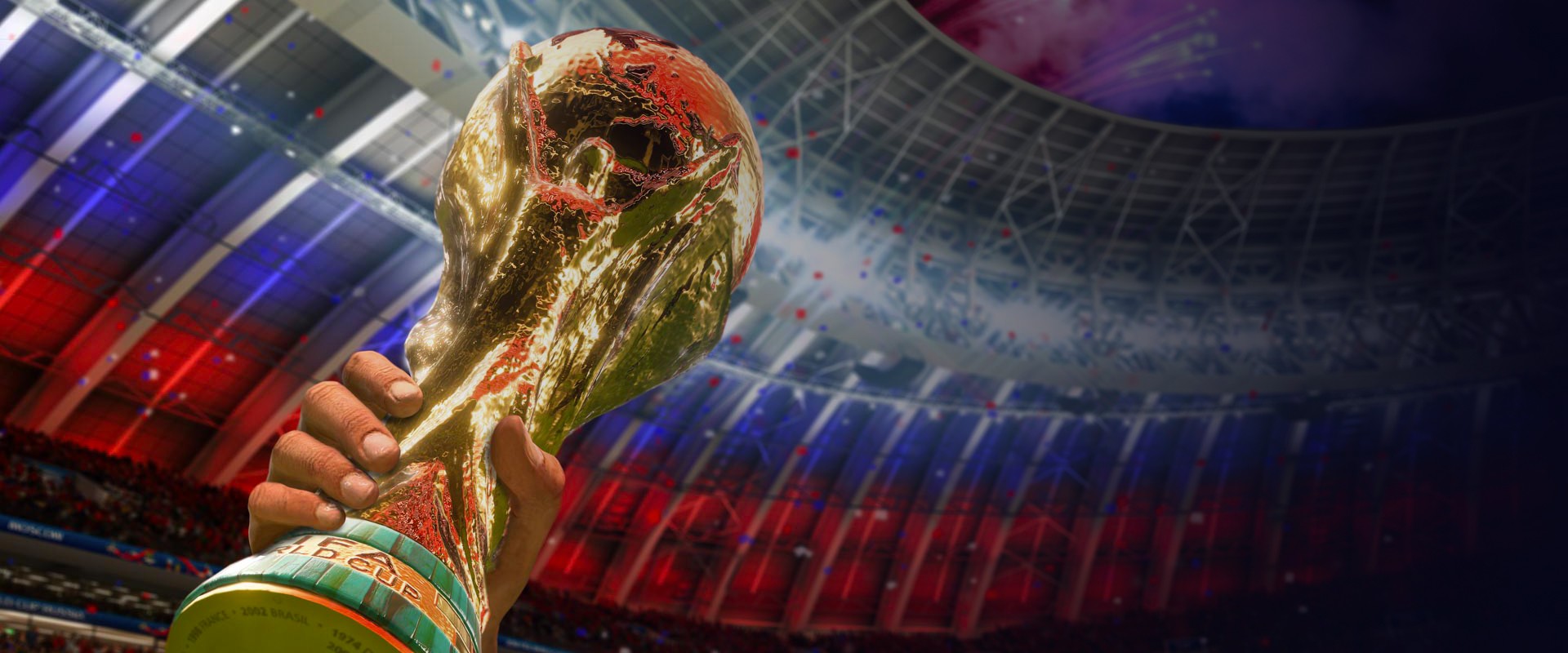Rundown on the 2018 FIFA World Cup, What to Expect Next
The 2018 World Cup was a huge success, both in the sports and political side. It was also what Russian President Vladimir Putin expected. Football's grandest arena didn't just entertain the whole world but also broke the myths about Russian society, as well as show how influential his regime is.
The tournament gave everyone a glimpse into what is like to play football in Russia. Well, that’s what Putin had in mind, and he aced it all the way.
Everyone who visited the country has surely left their hearts there because of the series of unexpected moments that happened all competition long.
Putin also turned out to be a warm host, a surprising thing knowing that he’s commonly seen as a strict and staunch advocate against libertarianism.
Looking at the football aspect, most journalists also agree that this was one of the best World Cups so far. The quality of play of each team showed he determined they are in getting the title, as well as the way the organizers managed to pull off the games in orderly fashion.
Even seasoned reporters can’t help but feel excited of the games, a proof of how great this year’s World Cup was.
Many expect Russia 2018 to be similar with Argentina 1978 because of the situation of both countries. The 1978 World Cup happened two years after Argentina experienced a massive coup which ravaged the country’s reputation.
Reporters then used it as a means to expose the bad side of the Argentine dictatorship. This heavily affected the Cup regarding popularity because it took away the people's focus from the pitch.
Fortunately, this wasn’t the case for Russia. Yes, Russia might be in a slightly different situation, but they do have a lot of similarities with the previous Argentina Cup.
The issue surrounding the Russian government’s political views, especially with what Putin thinks was seen by most media men to be a detrimental factor to the Cup’s popularity. But that wasn’t the case. Racists and staunch critics didn’t make it to the limelight.
The games were isolated from politics, and all Russian celebrated with the fact that their underdog team finished strong in the quarterfinal.
Though there was a slight issue about the video assistant referee, one can dismiss Russia 2018 as a huge success.
Meanwhile, the event also meant a lot for the other teams, especially for the champions, the French. Coach Didier Deschamps made history for being the third man to win as a player and a coach in the World Cup, next to the Brazilian Mario Zagallo and German Franz Beckenbauer.
This showed that anything could happen as long as determination and passion are mixed with skill and talent.
Deschamps also showed to the world that he’s more than just a fancy football icon. Having been heavily criticized as a person who lacks smart tactical skills, the French coach managed to prove otherwise as he showcased his innate genius into the pitch.
Take for example his strategic substitution a few minutes after the start of the second half.
N’Golo Kante, one of his go-to midfielders wasn’t feeling great due to a stomach bug. And committing three fouls throughout his 55 minutes playing time was too much for him. Not to mention that Kante got a yellow card.
Good thing Deschamps took notice of that and replaced him with Steven N’Zonzi, another midfield elite who’s proven his spectacular playmaking skills.
Deschamps, who was also a defensive midfielder in his early days knew that N’Zonzi’s game style would bring the French squad to victory. Well, that’s just what happened.
The French weren’t the most composed team, nor the most talented. However, thanks to Deschamp’s coaching genius, Les Bleus surpassed everyone’s expectation as they prioritized winning than entertaining.
After all, reigning victorious was fear better than showcasing a barrage of wonder strikes. The few passes, decent pass success rate, and low possession share wasn’t a big deal for them as it was all part of their plan.
Belgium, Argentina, and Croatia had a far higher possession rate as they reached 60 percent. But still, all of them fell at the hands of the French. It’s all about counterattacks for Deschamps.
Depending heavily on their defenders and midfield strengths boosted their core, and in the process, outsmarted their opponents.
Denying attackers crucial space also sealed the deal for their victory as their confident opponents concentrated more on their attacks and how they could breach the seemingly flimsy French midfield.
The determination of Les Bleus bore fruit as this also enabled their strikers to charge at the goal all throughout the game, of course, with proper pacing.
Paul Pogba and Kante had helped the midfield a lot, thanks to their fast shifting in between the upper and lower pitches.
What made things even better was that Kante’s defensive strength enabled Pogba to focus more on the offense. This ultimately tore down Croatia’s sparsely defended line and boosted Pogba’s confidence even more.
In fact, sports analysts from around the world agree that Pogba is one of the most incisive midfielders all throughout the competition.
Well, that wasn’t surprising at all because the Pogba Kante duo is the perfect combination even before the final. Also, Pogba can be seen as a developed player thanks to his mature thinking in Russia.
Thanks to this, the French side dominated the Croatians during the game. But this hadn't always been the case. Pogba was heavily criticized during the Euro 2016 due to his overly impulsive and flashy game style.
Good thing that he changed all that as his patience and pacing were prevalent since the start of the World Cup. Pogba had grown from once a flashy and highly aggressive player to a patient leader.
This is a huge improvement not only for himself but for the rest of the French squad as well. Les Bleus are known to be witty but lacks strategic strength at times.
Fortunately, they’ve grown from that, and hopefully, their victory at Russia 2018 will motivate them to continue their improvement so that when they set foot on Qatar the next time around, they’ll easily make it to the final again.
Belgium and their unsurprising run
Belgium, considered as one of the strongest teams in Russia, was a step away from achieving global domination. Unfortunately, their strong run since the start of the Cup was halted when the French defeated them at the semifinal 1-0.
Many expected the Belgians to win the title because they have their golden generation. Never before did Belgium have a talent-packed team, which is why everyone thought they'd make it to the final.
Eden Hazard, Romelu Lukaku, Mousa Dembele, and Kevin De Bruyne, are just some of the players who had a huge potential to bring the trophy to Belgium. Well, that’s just what happened despite them running short.
Nonetheless, it was a successful third-place finish for them after they beat Harry Kane's raging English team in the third-place faceoff. It wasn't only a successful finish for them, but a strong one, as well as they, left England scoreless 2-0.
Thomas Meunier scored a goal at the fourth minute, while Eden Hazard got a shot to the net at 82 minutes. No doubt that these players are great, but they won’t achieve such a milestone without Manager Roberto Martinez by their side.
Martinez is a perfect story of how a humble lad rose up from the lower leagues to global games. His innate tactical genius and ability to overturn games with a few game tweaks is what makes him a rare breed.
Their 2-1 victory against the Brazilians in the quarterfinal was also a turning point in their development as a team as Martinez’ game plans were executed smoothly. As what he said in an interview, his strategies wouldn’t be successful if it were not for the players.
Martinez said that the Belgian squad carefully followed his every strategy, and in the process, won the game. Unfortunately, his team still failed to finish what they started as they failed to cope with the seemingly invincible pacing and tactical genius that the French have shown.
Nonetheless, Belgium proved to be one of the strongest powerhouses in the football world, especially when it comes to the entertaining side.
Counter-attacks were the name of the game for them, and they won't mind even if their opponents' midfield lines were jam-packed with stars. Many were surprised to see how the favorite Belgian team smoothly made it deep into the contest.
One of those people is Viktor Gusev who is one of the most reputable commentators in the sports industry. Gusev said that Belgium’s recent World Cup finish had been the best so far.
The veteran commentator added that the Belgians were very unpredictable, organized, and fast. These three traits ultimately led to their easy transition from once labeled as football underdogs, to now being in the same level as Brazil, Argentina, Germany, and Spain.
However, the team's success wasn't just all about skill and talent but was the outcome of their superior accuracy and technique. The game of football had changed a lot since the days of Garrincha and Pele.
In the past, star players could easily dominate games by just using their innate talent. Take for example the two aforementioned players who had lots of space to breach their opponents’ lines.
But now, things are different as defenders are hardwired to secure the midfield lines no matter what it takes. And it's up to their opponents on how they're going to break those lines and score goals tactically.
This is one of the best reasons why the game of football is fast evolving. It’s now practically impossible for players to play the same way Garrincha, Pele, and other stars did in the past.
Now, proper planning and accurate tactical skills need to be present not only in the coach but in every player as well, for their games to turn out great.
Football is fast evolving
This is also one of the reasons why Ronaldo stood out against Spain because he was able to merge his super skills and athleticism with the way he used his witty tactical capabilities.
This enabled him, together with the rest of his Portuguese teammates to dominate early in the World Cup. Unfortunately, their consistency dwindles from time to time, the reason why they failed it to go past the Round of 16.
Yes, they might have dominated early in the game against Spain, Morocco, and Iran, but that domination was short-lived, as it was coupled with a series of draws. If only those draws were victories, then no doubt that Portugal would have fared longer in the World Cup.
Nonetheless, they did a great job when it comes to overall teamwork and pacing, two of the most important traits that teams need. Gusev, who’s known to be one of the more conservative commentators, was surprised to know that his forecasts didn’t turn out as expected.
Gusev previously expected the Germans to win a back-to-back World Cup championship. However, that didn’t happen. What instead happened was Die Mannschaft getting defeated by the underdog South Koreans, 2-0.
What makes it worse is that this happened early in the game, in the group stage to be exact. Because of this, Gusev believes that Russia 2018 will serve as a reminder to everyone that football is fast evolving and teams need to adapt to the growing changes fast.
The way teams approach every game should be carefully analyzed, as well as with the way that they deal with their opponents. Field intelligence is growing in importance in today’s football, and that’s what the players of today need to work on.
Croatia one step behind the title
Many consider Croatia manager Zlatko Dalic similar to Deschamps because of the way he approached the game. Focusing on strengthening their respective midfield and forward players enabled them to make it deep into the competition.
Dalic’s defensive game might have waned in the final, but his series of victories is enough to call their World Cup run a huge success.
Take for example Mario Mandzukic and Ivan Perisic in the forward positions. They aced it throughout the entire time they stayed in Russia. They broke through their opponents’ lines easily and showed no sign of backing down.
This motivated the rest of the Croatian team to keep pushing their selves further because they know they can make it. Even Ante Rebic’s performance exceeded expectations because of the way he roamed in the frontline.
Well, that’s because Dalic gave these three players lots of space to control their frontline. It was through this that they were able to maximize what they were best at, even if they weren’t the strongest attackers in the competition.
Having Croatia make it to the final is alone an impressive feat. Unfortunately, the imbalanced draw during the knockout rounds, as what analysts would say, had dealt a negative blow to their final games.
Europe dominates football
Everyone knows that the sport of football is dominated by the Latinos and the Europeans. However, Russia 2018 was more about the latter as the South Americans failed to make it to the final.
In fact, their exit caused the popularity of the World Cup to decrease as most of football’s fan base is found in South America. European support might be strong, but not as grand as what the Latinos can do for their respective countries.
Some even call it a continuous continental exit because the teams of every continent exited the tournament together.
First were the African teams who left during the group stage. Then the Asians followed after they were eliminated off the Round of 16, then came the time for the South Americans to leave in the quarterfinals.
Uruguay was defeated by France 0-2 while Brazil was kicked out by Belgium 1-2. The last time that this occurrence happened was way back in 2006.
Oscar Tabarez, coach of the Uruguay team, was asked in an interview as to why the European teams fared better than the others. Tabarez at first disagreed with the idea. However, he later hinted that there was a gap when it comes to their financial capabilities.
But then again, commentator Gusev thinks otherwise as Argentina's failed campaign was caused by systemic failure. Meanwhile, Brazil just had a single bad game.
He added that the Europeans aren’t superior football players compared to the Latinos, be it in the strategic side or when talking of the skills. Gusev continued saying that coaches go from one country to another, be it in Europe or America.
He also said that there is no difference between the game styles of the Latino and European players. Most football analysts agree with this as they also say that each team has their respective reasons on why they failed.
Generalizing the entire continent based on the campaign of one or two clubs is biased and shouldn’t be the case. Gusev continued saying that Europeans won the last three World Cups because of the team’s strength and teamwork.
Additionally, the financial situation of a team in international football doesn’t have a huge effect on their outcome, unlike club football.
In the case of the Latin teams, most of their coaches were left with little to no option other than to force players to play for positions which they aren’t very comfortable playing in.
Take for example Argentina’s Jorge Sampaoli who had a hard time bolstering La Albiceleste’s defense due to their lack of defensive-oriented players. They might be strong when it comes to attacks, but they lack the needed defense to fend off their opponents’ offensive strength.
The deputy director of the Centre of Sectoral Research and Consulting in Moscow’s Financial University, Nikita Osokin, talked about the outcome of the tournament. Osokin said that Russia would have gained more financially if the South American teams reached the later stages of the World Cup.
He said that the size of the fanbase has a bigger impact than the reputation and fan base of the team. According to reports, fans from the USA and South America had the highest amount spent during the World Cup, and most of them supported the Latin and South American teams.
Final verdict
Furthermore, the 2018 World Cup left a mark not only in the football world but the history of the global community as well.
It united the world, and it gave everyone a sense of unity as it showed how different countries, even those that are surrounded with political issues, can go about dealing with sporting events that not only bring entertainment but shows to us how we can set aside our differences.
Doping tests turned negative, racist chants gone, and players and coaches are creating new ways of outcompeting each other. Along with it are the signs that the sport of football is further developing and becoming more competitive. Indeed, football has come a long way.
It’s through this that one can easily say that a brighter future waits for football and the global community as a whole.



